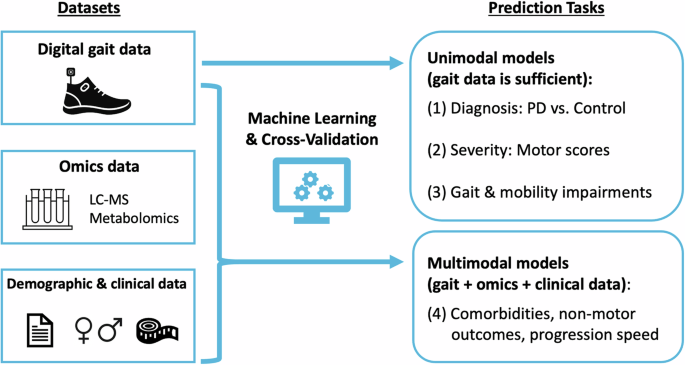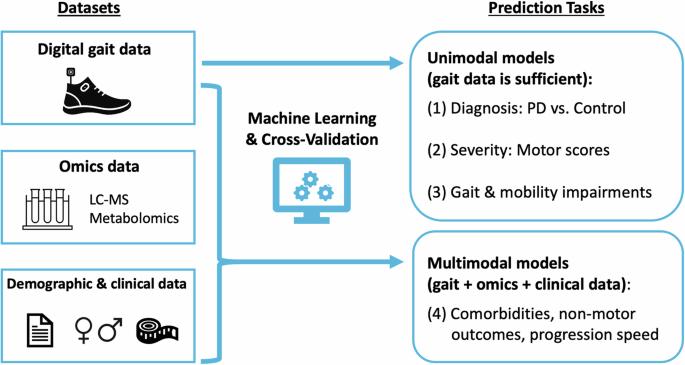Integrating digital gait data with metabolomics and clinical data to predict outcomes in Parkinson’s disease
IF 12.4
1区 医学
Q1 HEALTH CARE SCIENCES & SERVICES
引用次数: 0
Abstract
Parkinson’s disease (PD) presents diverse symptoms and comorbidities, complicating its diagnosis and management. The primary objective of this cross-sectional, monocentric study was to assess digital gait sensor data’s utility for monitoring and diagnosis of motor and gait impairment in PD. As a secondary objective, for the more challenging tasks of detecting comorbidities, non-motor outcomes, and disease progression subgroups, we evaluated for the first time the integration of digital markers with metabolomics and clinical data. Using shoe-attached digital sensors, we collected gait measurements from 162 patients and 129 controls in a single visit. Machine learning models showed significant diagnostic power, with AUC scores of 83–92% for PD vs. control and up to 75% for motor severity classification. Integrating gait data with metabolomics and clinical data improved predictions for challenging-to-detect comorbidities such as hallucinations. Overall, this approach using digital biomarkers and multimodal data integration can assist in objective disease monitoring, diagnosis, and comorbidity detection.


将数字步态数据与代谢组学和临床数据相结合,预测帕金森病的预后
帕金森病(Parkinson's disease,PD)的症状和并发症多种多样,使诊断和治疗变得更加复杂。这项横断面单中心研究的主要目的是评估数字步态传感器数据在监测和诊断帕金森病运动和步态损伤方面的实用性。作为次要目标,我们首次评估了数字标记物与代谢组学和临床数据的整合情况,以检测合并症、非运动结果和疾病进展亚组等更具挑战性的任务。我们使用鞋上安装的数字传感器,在一次就诊中收集了 162 名患者和 129 名对照组患者的步态测量数据。机器学习模型显示出显著的诊断能力,对帕金森病与对照组的AUC评分为83-92%,对运动严重程度分类的AUC评分高达75%。步态数据与代谢组学和临床数据的整合提高了对幻觉等难以检测的合并症的预测能力。总之,这种使用数字生物标记物和多模态数据整合的方法可以帮助进行客观的疾病监测、诊断和合并症检测。
本文章由计算机程序翻译,如有差异,请以英文原文为准。
求助全文
约1分钟内获得全文
求助全文
来源期刊

NPJ Digital Medicine
Multiple-
CiteScore
25.10
自引率
3.30%
发文量
170
审稿时长
15 weeks
期刊介绍:
npj Digital Medicine is an online open-access journal that focuses on publishing peer-reviewed research in the field of digital medicine. The journal covers various aspects of digital medicine, including the application and implementation of digital and mobile technologies in clinical settings, virtual healthcare, and the use of artificial intelligence and informatics.
The primary goal of the journal is to support innovation and the advancement of healthcare through the integration of new digital and mobile technologies. When determining if a manuscript is suitable for publication, the journal considers four important criteria: novelty, clinical relevance, scientific rigor, and digital innovation.
 求助内容:
求助内容: 应助结果提醒方式:
应助结果提醒方式:


